May 5, 2016
Back Story
If you follow this blog, you’ll already know a lot of the Nickelsville Dearborn story. That’s the camp at 1010 South Dearborn Street near downtown Seattle that sheltered between 35 and 50 homeless people from the late 2013 to the early 2016. The camp was beset by problems from the outset and saw two rebellions against non-resident camp manager Scott Morrow over the course of a year. The second rebellion was successful, but ultimately led to the eviction of the camp by Seattle police and the scattering of its residents.
In two recent articles, I examined an $87,000 property tax exemption that was granted the owner of the Nickelsville site by the Washington State Department of Revenue. The exemption was granted under Washington law RCW 84.36.043, which gives landowners a tax holiday if they allow their property to be used for transitional housing (read: homeless camps). In Washington, such camps generally require a church to sponsor them, and in this case, the church of record was the Lutheran Church of the Good Shepherd under Pastor Steve Olsen. When Olsen applied for the tax break, he committed to do certain things to ensure that the camp was genuinely helping people to transition into permanent housing (hence the term: transitional housing). Unfortunately, most of the things Olsen committed to doing never came to pass. For example, he claimed that the entire site would be used for a homeless camp, but in fact, two thirds of the tax-exempted property sat fenced off and empty for the entire time. According to what campers told me, they were forbidden even to set foot on that part of the property (story here). Olsen also committed to give “pastoral counseling” to the campers, but according to the ones I spoke with, that never happened either (story here).
Pastor Olsen also said, in his application for tax exempt status, that a local housing non-profit group called LIHI (the Low Income Housing Institute) would provide case management services for the homeless campers to ensure that they were getting the help they needed transitioning to permanent housing. And that’s where we rejoin the story . . .
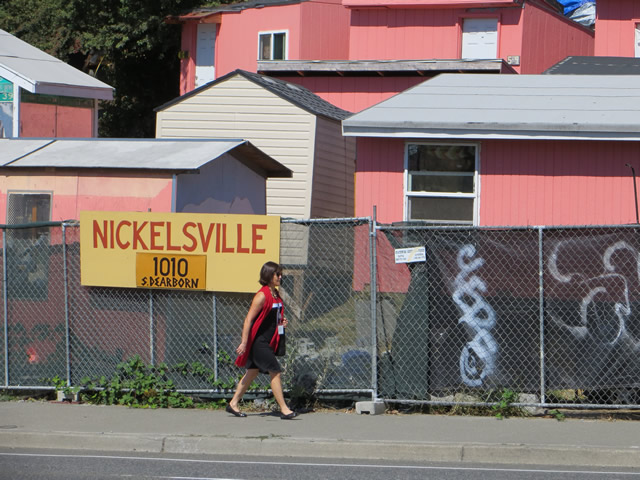
What was LIHI supposed to do at Nickelsville?
According to the tax application, LIHI was supposed to be providing case management services to camp residents. Seattle lawyer Kim Risenmay, who acted as Pastor Olsen’s agent in completing the application, says that Charese Jones at LIHI told him that LIHI staffers went there “multiple times” each week and spent “significant amounts of time.” The proof of that claim apparently lay in Ms. Jones’ assertion that many Nickelsville residents had already been placed in housing through the good offices of LIHI. Examples of “success stories” were provided further down in the application, but with the names and other identifying information removed, it’s impossible to know whether those success stories were real or fabricated. It’s possible that they represented real people from other homeless camps, not Nickelsville.
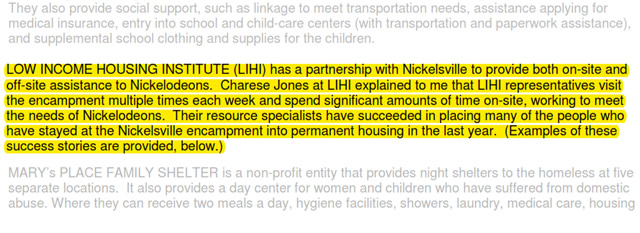 Unfortunately, like so many other parts of this application, the claim about LIHI making frequent visits to the camp and “working to meet the needs of Nickelodeons” was not borne out by the campers and Nickelsville staff that I spoke with. When I read the language above to three campers (Jack, Daniel, and Troy) who had relocated to another camp after the March eviction, they scoffed and told me they had never seen any LIHI caseworkers at Nickelslville during the months they were there. Another former camp resident, Cecilia, told me that she met with the LIHI caseworker who had been assigned to Nickelsville and that person had told her she was afraid to enter the camp, that she didn’t feel safe there.
Unfortunately, like so many other parts of this application, the claim about LIHI making frequent visits to the camp and “working to meet the needs of Nickelodeons” was not borne out by the campers and Nickelsville staff that I spoke with. When I read the language above to three campers (Jack, Daniel, and Troy) who had relocated to another camp after the March eviction, they scoffed and told me they had never seen any LIHI caseworkers at Nickelslville during the months they were there. Another former camp resident, Cecilia, told me that she met with the LIHI caseworker who had been assigned to Nickelsville and that person had told her she was afraid to enter the camp, that she didn’t feel safe there.
David Delgado was hired as an “organizer” for Nickelsville starting in the fall of 2015. He told me that while he was there, a LIHI staff person did stop by the camp every Friday, but only for the purpose of getting a weekly report. That person did not provide any case management services, he said. Delgado was intimately involved in the rebellion that shook the camp in late January of 2016. Accounts of why the rebellion happened vary, but several campers have claimed that the camp was generally neglected by those who were supposed to be watching over it and that it was a combination of that neglect and poor management decisions by camp boss Morrow that caused the rebellion. Here’s a brief timeline of those events and LIHI’s part in them:
- On January 27, 2016 a majority of campers voted camp boss Scott Morrow out of his position and asked him not to return, citing their belief that his policies – particularly those around drug use – were making the camp unsafe.
- On February 4, two Seattle councilmembers (Lisa Herbold and Kshama Sawant) met with camp organizer David Delgado and other campers at Delgado’s request. Two LIHI staff attended one of those meetings. LIHI’s Executive Director Sharon Lee did not attend the meeting with Ms. Herbold, although she was invited to do so by Mr. Delgado.
- On February 19, LIHI’s Executive Director Sharon Lee, Pastor Olsen, and landowner Chris Koh, sent a letter to Mayor Murray and the Seattle City Council asking them to remove the camp in response to Morrow’s ouster. In that letter, which you can read here, Lee said that the camp must be shut down because it was no longer providing “accurate records, intake forms, and documents required by LIHI and the [land]owner for the purposes of [fulfilling . . .] our mutual contract . . . . [emphasis added]
- On March 11, after an earlier botched attempt at removing the camp, Seattle Police Department finally evicted the remaining campers.
On April 21, I sent Ms. Lee an e-mail at her LIHI address, citing LIHI’s section of the property tax exemption application above and asking her if she could document any caseworker visits to the Nickelsville camp on Dearborn street. I also asked her whether she had responded to Mr. Delgado’s requests to meet with him after the rebellion to discuss his view of the situation and why she was a no-show at the meetings between Delgado and city councilmembers. Finally, I asked whether she had ever visited the camp to see for herself the various things she claimed to have knowledge of in her letter (weapons, drugs, alcohol). Ms. Lee did not respond to my questions.
Why didn’t LIHI staff do their job?
Spoiler alert: Nobody knows . . . although perhaps a more relevant question would be: Why would a large, well-funded, and respectable housing provider like LIHI – a group that provides homes for thousands of people – be messing around with a sketchy homeless camp in the worst part of town? A camp that never served much more than 35 people? It makes no sense . . . unless you happen to know that both Nickelsville and LIHI are creatures of Scott Morrow. (See the postscript section for more details.) But leaving aside the question of why LIHI got involved, once it was involved and its reputation at stake, how could it have failed to follow through and send caseworkers to the camp?
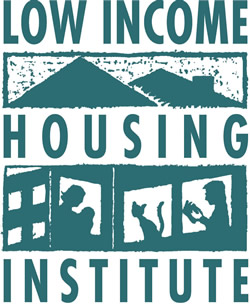
It’s not like they didn’t have any to send. Indeed, according to the group’s online “Supportive Services” directory, there are no fewer than 13 case managers on staff, plus two supervisors. Yet, still it seems that LIHI was unable to spare a single one of them to visit Nickelsville during its 2+ years at the Dearborn site. According to former camper Cecilia, the caseworker who was assigned to Nickelsville was afraid to go there. Which is certainly plausible. But in that case, why didn’t LIHI just assign a different caseworker, or send caseworkers out in pairs, for safety?
It’s telling that the organization’s executive director, Sharon Lee, would not (or could not) document a single time she or or any of her caseworkers had visited the camp. She claimed, in her eviction appeal to the City, that there were drugs and weapons in the camp, and that there was a general breakdown in social order. But if she never went there herself, how would she know that? Perhaps she just took Mr. Morrow’s word for it. But then, Morrow himself was rarely in the camp, and this was in fact one of the reasons he had been removed from his position.
If there was ever an example of setting poor people up to fail, this is it.
The people running Nickelsville made several commitments to the Department of Revenue in exchange for their $87,000 property tax break. Of the three we’ve looked at so far (using all the land for the camp, providing pastoral counseling to the campers, providing case management to help them get out of homelessness) none were delivered. In the next piece in this series, I’ll examine three more commitments that also went unfulfilled.
Story by David Preston. Photos by David Preston, except where noted. Additional research provided by Karen Morris and Janice Richardson. The author wishes to thank the homeless and formerly homeless individuals who shared their time, stories, and courage with him.
Postscript: A closer look at LIHI
According to an article in Wikipedia, LIHI was founded in 1991 by Scott Morrow, Michael Reichert, and Frank Chopp. Twenty-five years later, none of the founders is still involved with the daily operations of the organization, though each of them is still very much involved in housing policy . . . and with public money. Scott Morrow runs the non-profit group SHARE, which, in addition to being the parent organization of Nickelsville, manages a constellation of small indoor shelters around Seattle, as well three tent camps inside Seattle and two elsewhere in King County. For these services SHARE gets around a million dollars a year in cash grants and subsidies per year, in addition to an unknown (because largely unreported) amount in private in-kind donations. Mr. Morrow’s doings have been covered extensively on this blog.
Michael Reichert runs Catholic Community Services of Western Washington, which was capitalized at $61 million in 2014 and had an income of $110 million in grants and other funding, much of it related to housing. Reichert’s paycheck for 2014 was $173,000, and the combined pay for the top executives of the organization was around $2 million (according to the group’s 990 tax form).
Frank Chopp has represented his north Seattle district in the Washington State Legislature since 1994 and has been Speaker of the House (or co-Speaker) since 1999. As chair of the powerful House Rules Committee, Chopp exercises a great deal of influence over which bills make it out of committee. If he doesn’t like a bill – or just doesn’t like the sponsor – he can kill it. Chopp also has the power to punish representatives who don’t vote his way on budget items that he favors. Although he keeps a low profile on the House floor, he has been the moving force behind a handful of mammoth capital projects related to housing. Chopp also serves as a paid consultant for Solid Ground, an organization that receives a considerable share of funding from the state. Solid Ground in turn has ties to LIHI and other organizations that get money originating with Chopp-approved state budgets. Mr. Chopp has also advocated on behalf of his old associate Scott Morrow. In 2009 for example, he intervened with the Port of Seattle to prevent them from summarily evicting a Nickelsville camp that had appeared on Port property in southwest Seattle.
Sharon Lee was apparently hired on at LIHI when Scott Morrow was still involved in running the organization. As the organization expanded, she rose quickly through the ranks and now, as Executive Director, she makes more than $176,000 a year and oversees an organization with capital investment of over $51 million and some $5 million in annual income. (See LIHI’s tax return for 2013 here.) Not surprisingly, Ms. Lee, like Mr. Chopp, is well connected in budgetary circles. She is registered as a lobbyist with the Seattle Ethics and Elections Commission and keeps herself in the good graces of local politicos by naming LIHI apartment buildings after them. (See Frank Chopp Place, for example . . . wink!) Wherever there’s something happening with “affordable housing” at City Hall, there’s a good chance she’ll be there. Here’s a recent picture of her with Mayor Ed Murray as he signs a bill placing a $290 million housing levy on the 2016 ballot:
Needless to say, if the levy is approved, some of the money will go right into LIHI’s coffers. Maybe Ms. Lee will even given herself a bonus.
As a former employee of Mr. Morrow’s, Ms Lee is now one of his main links to City Hall. Below is a picture of Lee conferring with Morrow before she speaks at a “people’s budget” rally called by socialist councilmember Kshama Sawant last November (story here). Guess what “the people” were being asked to budget their money for at that event . . .
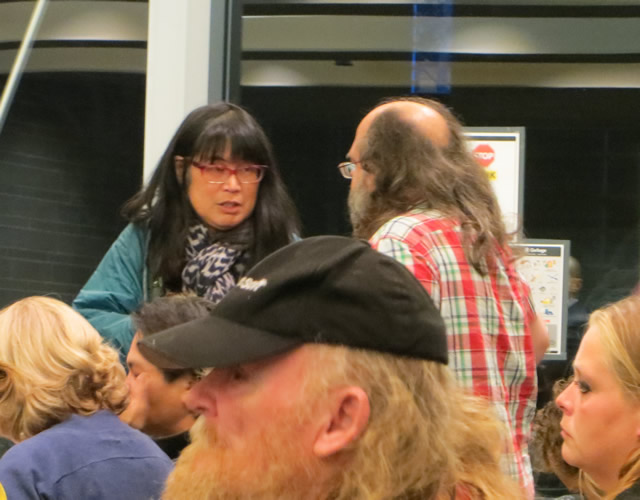
Ms. Lee and Mr. Morrow are jointly managing four other homeless camps in Seattle, all at city expense. Given that she’s so devoted to the problem of homelessness, it’s a pity Ms. Lee couldn’t find the time to answer my questions about the Nickelsville debacle.
Or meet with camp organizer Delgado at City Hall.
Or visit the camp herself.
Or send any of her caseworkers there. Even after she promised . . .


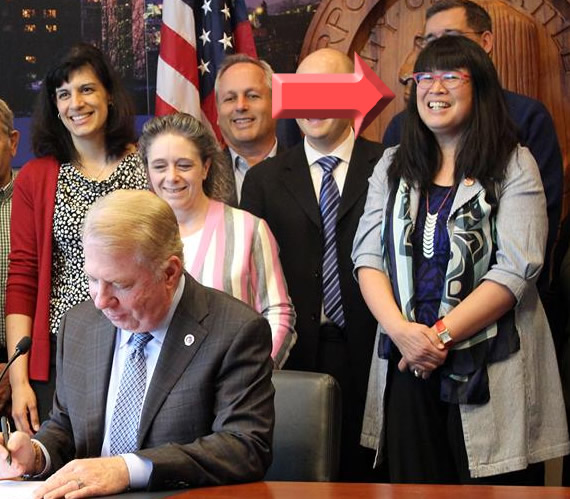










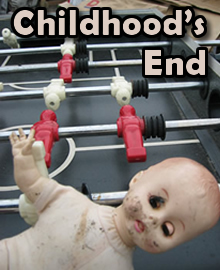






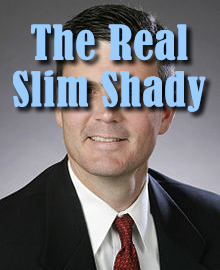



An interesting and disturbing read. Thank you for your effort.
I was just fired from a LIHI property because I dare bring up the lack of support for clients & being told to ignore clients
Fantastic work David-think you are getting some traction among the citizens of the city who haven’t yet lost all semblance of common sense. A couple of questions: Who owns Coho properties? To what extent do the protagonists and their obviously corrupt organizations, in this sordid tale contribute to the campaign coffers of our esteemed council members, mayor and state legislators.
It is becoming increasingly clear to me that the organizations who benefit from the “homeless crisis” have no true incentive to find a meaningful solution to this problem. In fact the increasing amount of unaudited taxpayer money pouring into the businesses tasked with solving homelessness argues that the “problem” will only worsen as the money increasingly pours in without accountability. Easy to understand why Ms Lee is smiling as Mr Murray signs the tax increase.
Needled:
COHO properties is owned by Christopher Koh. Koh is multimillionaire land developer who has properties and political connections all over the Seattle area. Koh owns several historic buildings in the Chinatown area, including the Milwaukee apartment building, which received quite a bit of publicly provided renovation money a few years back, in exchange for the owner’s agreement to set aside a certain amount for low-income housing.
The amount Koh saved in property taxes on the Nickelsville Dearborn property ($80,000) is pocket change to him, so I don’t see his role as shady. I don’t think Koh id anything wrong other than failing to apply diligence, but SHARE, LIHI, and Pastor Steve Olsen definitely DID do something wrong, when they lied to the State DOR about what was going to be happening on the property. My guess would be that property owner Koh told SHARE’s Scott Morrow that he could do as he liked on the property, as there wasn’t any blowback on him.
There’s also the possibility that Koh was muscled into doing this. Perhaps Koh owed LIHI director Sharon Lee a favor, and since Lee appears to owe Morrow many favors, Morrow could use that connection to get access to Koh’s land. That’s all speculative, though.
Thanks for the reply David- This ‘crisis’ has to be fueled by money making its way back channel to the politicians propagating this fraud. I see no viable reason that any politician, socialist or otherwise (not to mention the entire city council) would stake their career on homeless advocacy or rights, as this issue is quite simply a loser at every level. The homeless are not a voting bloc or a source of campaign cash. Advocating for the homeless to camp and dump their needles in public spaces clearly abrogates the rights of the tax paying citizens (and gets them on the petition warpath). Why would any savvy career politician stake their survival on this solitary issue which is likely strongly opposed by the majority of their constituents? In my mind there is no other reasonable explanation, it has to be money. I realize that Morrow and Lee have friendly relationships with the council members and mayor, and they may have a pile of favors in the favor bank. But friendship only goes so far, and NO politician would commit career suicide over ‘compassion for others’ and homeless rights. Have you found any evidence of illicit or other contributions to council members or other elected officials in your research? For instance did the $143k contributed by SHARE for the waterfront sculpture really go for this purchase or did it get skimmed and distributed elsewhere? I would suspect the latter, but maybe i’m just overly cynical.
Sharon Lee really ought to resign and allow the homeless to be housed properly.